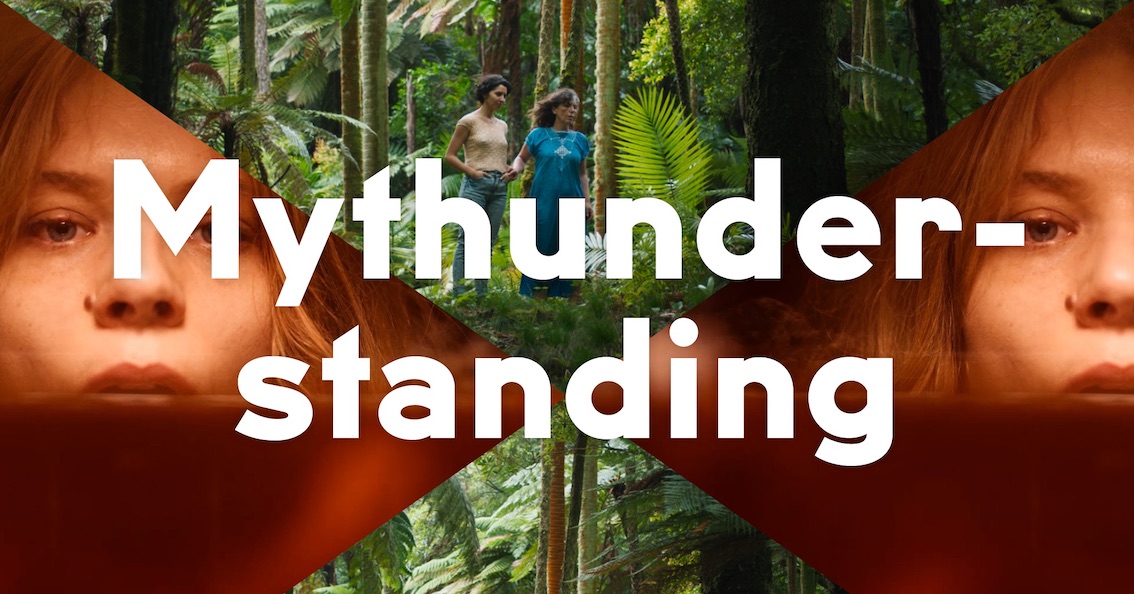Blog #8/22 Uncommon Language?
By Innas Tsuroiya
As a response to the program ‘Mythunderstanding’.
“Wind, rain, fire, fog. This island they want to steal. Ariel, this tree will take care of you…”
Sycorax, the myth, and Sycorax, the film, serve as an entrée into a grander banquet. The former is a preliminary to other characters’ stories in Shakespeare’s The Tempest, the latter – a catalyst of the future joint between directors Lois Patiño and Matías Piñeiro. The pair might have different, if not diametrical, approaches to filmmaking, and yet they gather to realise a vision out of a translated play. When asked about the specifics of their present collaboration and this myth of choice during the Berlin Critics’ Week event Mythunderstanding, Piñeiro’s answer from the earlier part of the debate strikes me, and I wish it had been brought up again later. Other than as a preparation for a feature-length project, it is to find a common language between two filmmakers with respective niches.
Such a curious coincidence – this reasoning for a common language – that no speakers have anything uniform to say on why myth, what it is, what it does. According to them, it can be: a big symbol for human conflict or subject; either a reactionary or a non-reactionary type, so its characteristics depend on the [film’s? artistic or moral?] tasks; fragmented and hollow versus complete and unchanging; not a context but a way of saying things, yet not a good one because it is a kind of hiding; so timeless and sacred that any modern rendition to revisit the tale of mythology is a reflection of human truth. The last one comes from an audience member, even.
“What attracts filmmakers to myths and to the idea of rewriting them?” is one of the program prompts, yet of everything that was promised, only a little got delivered. Meandering dialogues, name-dropped Marxist-feminist scholar Silvia Federici without explicit mention of capitalism, quoted Žižek apart from the context. One speaker launches a rant as if explaining about the film he had wanted to see in lieu of the film he just saw before digressing. Another speaker couldn’t attend, so she sent a short letter about the pandemic reality instead. It would at least be reasonably whimsical, to contrast the tension in a debate wittily titled Mythunderstanding, to ask the Love Is a Dog from Hell actress Lilith Stangenberg, who is present, about her first name. Alas, so much potential talking points are left unexpanded. Piquant is not a word to describe my impression of the debate as I’d hoped. Regardless, the question remains inquisitive. What, really, attracts filmmakers to myths and to the idea of rewriting them?
Sycorax, the film, wants to fill the gaps that Sycorax, the myth, had left. Can a cross-form rewriting, then, offer something refreshing? Patiño and Piñeiro openly distrust Prospero’s voice in the play and want to see if the source text could have another rhythm where, as opposed to the colonialist narrative, the peaceful island is not actually “uninhabited.” Sycorax invites the viewers to tend to that scepticism by rendering Sycorax embodied, her (previously nonexistent) vocals repetitive and more empathetic. That she imprisons Ariel for survival against Prospero’s occupation of the island, not as punishment as we know it, is relayed like weeds growing through the cracks of mythology’s concrete.
While in Sycorax someone is trying to trap the free, in Love Is a Dog from Hell someone is trying to free the trapped. In poet and filmmaker Khavn de la Cruz’s punk rendition, chromatic Manila is one of the gates of Hell where Orpheus’ twin sister Orphea is the wandering one. Unlike the origin myth, in which Orpheus is a gifted musician making music out of grief and impressing the gods prior to retrieving a lost love, Orphea is otherwise met with several songs amid the city’s chaotic nadir in her ongoing quest for dead Eurydiko. True to form, in this part of the debate two speakers do disagree (finally), although the arguments don’t really progress from whether the origin myth is actually a muse-artist type of tale about power and patriarchy (maybe), whether gender reversal is possible (yes) and/or doing something of a particular essence in this context (still vague, save for another debate). What else, however under-discussed, is at stake?
Colonialism is briefly mentioned several times, though sadly the talk barely scratched the surface of its relationship with mythology-making. What is, historically, formally, cinema’s role in it? With the films in the program, one might expect the debate to touch more on this topic. What do both films counter, achieve, not achieve? The dialogues struggle to approximate a common language to cut through semantic barriers before moving on. At some point, it is discussed whether myth can’t make an effective communication in its open-endedness (?). But colonialist myth couldn’t be more literal with its aim to exploit; while these films, and perhaps many others attempting similar rewriting, often speak in figurative speech. If every gap requires to be filled, should the debate/program have tried to bridge the steer toward that sort of discussion too? Anyway, here the wager is on each filmmaker’s pursuit.
Love Is a Dog from Hell is not the first film that twists the Orpheus-Eurydice tale. It’s not even Khavn’s first film that does so. This reveal of a thematic thread might advance the discussion from there; unfortunately, he isn’t present to deliver the answer himself, were he asked. Piñeiro – for whom Sycorax is not the first film that germinates from Shakespearean tales, nor will it be his last – and Patiño are attracted to its rewriting for two possibilities: their perusal of the play’s Latin American translation(s), hence the short is in Portuguese and Spanish, and the character portrait. In the same vein of building narrative integrity: the missing footnotes in contemporary editions push them to highlight what’s obscure(d) by way of literary vignettes, while the missing personification of Sycorax propels them to employ nonprofessional actors, as this apparition can manifest in just about anyone.
It calls to mind that in the field of design and technology, new mythologies are proposed and called for to anticipate environmental collapse. The demand for new mythologies as an organizing principle is to generate new conversations, which then equip people for subsequent actions (machine blueprint, alternative infrastructure, and so on). Albeit of a different immediacy, throughout the debate such consideration conjures a thought on cinema, the conspiring stories onscreen and beyond. When filmmakers scrape off the layers of old tales and begin rewriting them, to what end do they want the new bud to sprout? What fire could Caliban’s mother in Argentina and Orpheus’ female incarnation in the Philippines possibly spark?

